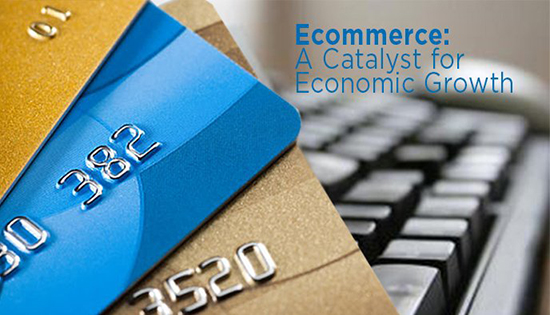Ecommerce: Catalyst for Economic Growth
https://admateacademy.blogspot.com/2017/04/ecommerce-catalyst-for-economic-growth.html
The viability and rich opportunities that ecommerce makes available globally is not in question, because the high global ecommerce revenue earnings are a clear indication. However, the real challenge is what is required to harness the great opportunities ecommerce offer.
Before now, we used to say the internet is the future, but all that has changed so rapidly in the last six months; the Internet is present with us here today, affecting every aspect of our lives. Everything around us has gone digital and ecommerce has become an essential part of our life. We must draw attention to this vital digital economy that some countries in Africa are yet to fully exploit, despite enormous opportunities to earn foreign exchange. Ecommerce has a very high growth rate of 200%, and according to the eMarketer, global ecommerce reached $3.535 trillion, despite a 20.7% decrease in 2019.
Considering the huge foreign exchange earnings accruable from ecommerce, it is expedient that countries in Africa start to address the challenges impeding growth of ecommerce, particularly in the areas of merchant accounts, acquirers (banks), payment processors, legal and fraud related issues. It is necessary to also focus on some of the fundamentals of ecommerce marketing such as to create awareness and provide the relevant foundation and guidelines for a successful participation of small and medium scale entrepreneurs in the sector.
What is Ecommerce Marketing?
The term ecommerce had a different meaning in the 1970's. At that time, ecommerce was done electronically through electronic data or electronic funds transfers (EFTs), and it was not used for buying and selling of goods and services. The term ecommerce marketing emerged in the early1980’s when the buying and selling and distribution,of goods and services through electronic funds transfer using the Internet was introduced. Ecommerce has differently names, it was referred to as e-Retail, Internet merchandizing, electronic store, e-Business, e-Tailing, e-Marketing etc. ecommerce marketing is mainly about attracting web surfers to your site and converting these visits into sales.
Ecommerce is defined as the buying, selling and distribution of goods and services through Internet funds transfer. Ecommerce marketing is a process that is based on the use of electronic devices such as mobile phones and computer systems, and other online marketing technology and processes to facilitate payment for products and services. Ecommerce has made it possible for banks to implement Straight-Through-Processor (STP) model, which eliminate staffing and manual banking and thereby reduces their operational cost.
The Internet has become an essential part of modern business and its impact is felt in all facet of human endeavour. The tremendous advancement in telecommunications technology and web development have changed the global business environment, making it mandatory for organizations to become adaptive to the dynamics and trends of ecommerce in other to remain competitive and benefit from the opportunities it avail.
The Internet provides a platform for businesses and marketers that is so enormous that it is expected that online shopping will hit 4 trillion in 2020. There are about 3.4 billion Internet users globally, and increasing number of people around the world are using the web to search for products, entertainment, friendship, and also for research on consumer behaviour and to analyze market trends.
The way companies market their products and services to their customers have changed dramatically with the advent of ecommerce. For any business to be successful and remain relevant in this modern day, such an organization require the services of marketers, strategists and consultants with profound knowledge, relevant skills and understanding of effective management of digital media marketing channels such as websites, e-mail, mobile and interactive TV and social media.
Trends in Ecommerce Marketing
Understanding how the advancements of the Internet apply to ecommerce, will drastically help organizations in their efforts to develop a digital marketing strategy. Customer tracking, research about consumer behaviour and market analysis are all essential ecommerce marketing processes. User’s utilization of resources can be tracked easily on the Internet and e-mail updates can be sent to customers when new products or services are available. Email marketing is a tool that provide organisations with the the opportunity to sign up and grand approval to be part of the distribution list for such content, and can therefore validate the credibility of such information.
Digital media marketing presents a significant opportunity for an organisations to engage on ecommerce. As part of the digital media strategy an organisation must develop it's brand and digital media marketing offers a variety of advertising channels. Digital Advertising revenue will account for US$198,439m in 2017, and Global mobile advertisement spend will account for nearly 62%, while Social Media Advertising is expected to reach US$27,065m in the same period. It is predicted that ecommerce will dominate retail business in the next three years, with 80% of the buying process are expected to occur without any direct face-to-face interaction, as reported by the New Buyers Journal.
Challenges of Ecommerce Marketing
Ecommerce activities in some of these countries are mostly online shopping and less of selling, which clearly reflects a gross import/export trade imbalance. Though some banks are now providing access to some sort of online payment through the various debit card services like Visa and MasterCard, there are still challenges making online payments using these cards on many merchandising websites. How does an online store owner receives payment for goods and services from foreign shoppers, when there are no Acquirer Merchant Account processors?
Ecommerce activities in some of these countries are mostly online shopping and less of selling, which clearly reflects a gross import/export trade imbalance. Though some banks are now providing access to some sort of online payment through the various debit card services like Visa and MasterCard, there are still challenges making online payments using these cards on many merchandising websites. How does an online store owner receives payment for goods and services from foreign shoppers, when there are no Acquirer Merchant Account processors?
There are very few companies and bank presently providing Acquirer or Payment Processor services to facilitate fast and easy receipts of payment in this region. The benefits of fully engaging in ecommerce are enormous, especially in the area of foreign currency earnings. These countries lose much by not being a part of the steadily growing market and high patronage that ecommerce enjoys. Google estimated that over 8 million people surf the net for products and services each day, and this makes the Internet the busiest and largest single market in the world, and a place where people engage in buying and selling of products and services without any physically interaction.
Many ecommerce marketing reviews, reports and projections by experts in the industry have predicted a positive growth in the sector in the year 2017 and beyond. The digital media marketing sector, as reported by Invespro in 2016, shows that global online retail sales hit $1.888 trillion, growing at a rate of 7.4% and will increase to $2,489 trillion and 8.8% growth rate in 2018. The market is expected to maintain a double-digit growth that will continue through 2020, with sales topping $4 trillion (eMarketing). Nigeria's ecommerce revenue tops online retail sales in Africa with 2.3%, followed closely by Kenya 2.0% and Algeria 1.6%. Presently we do more of buying than selling online.
Apart from losing revenue, these economies also do not benefiting from the large employment opportunity ecommerce avails. With just a WiFi enable laptop, individuals can engage themselves by starting an online merchandizing business, but the absence of payment gateways and acquirers is an impediment, which deprives young entrepreneurs the benefits of engaging in legitimate self-employment, and thereby contribute to the GDP of their country, instead of directing such energy towards Advance Fee Fraud (419) activities. The pressure by World Bank and Microsoft on the Nigerian National Assembly to pass into law the cybercrime bill, highlights the concerns of foreign governments and multi-national companies regarding the menace of cybercrime.
The Role of Financial Institutions in Ecommerce
Technology is the driving force of ecommerce and it is a complex chain of back-end engines powering the processors, acquirers and ad merchant web sites. Essentially, it is the wish of every merchant site to be able to sell their products and services, and as such, they would like to accept credit and debit cards from various card schemes that are available. This extensive network of channels supporting the ecommerce market, transcends the traditional trading methods, and forms the biggest driver of growth of the industry.
Commercial banks play a fundamental role in the implementation, development and growth of the ecommerce market. It is the banks’ duty to manage information, which include the capturing of information from the activities of the card issuers, acquirers and schemes in the payment processing chain. The banks also play a strategic reporting role by providing regulatory information to government tax authorities, State security services and the Central Bank.
It is the bank's responsibility to provide a single interface that service all card-related issues, such as card authorization, recovery of money from the issuing banks, payment of all the scheme and issuing fees on behalf of the merchant, and intermediate when there are issues of claims, returns and refunds.
How Payment Processors Function
Payment processors provide the front-end solution to support online merchandizing and point-of-sales service, and act as the gateway between retail merchant store and card issuers. The merchant acquirers are the back bone of ecommerce, and are largely the providers of the platform for financial transaction on the Internet.
Payment processors provide the front-end solution to support online merchandizing and point-of-sales service, and act as the gateway between retail merchant store and card issuers. The merchant acquirers are the back bone of ecommerce, and are largely the providers of the platform for financial transaction on the Internet.
The role of the retail shop owner is to capture the card using a POS terminal that connects to the acquirer’s database for authorization of the transaction. The acquirer routes the authorization request to the appropriate gateway, which in turn routes it to the appropriate card issuer, and then the card issuer checks to ensure that there are funds in the card, before authorizing the gateway to make deductions from the card account. This process ensures that payments are duly effected in support of a transaction.
Conclusion
Ecommerce sector is very lucrative, and all the players in the sector benefits one way or another, and fundamentally, one of such benefits is its ability to expand on a continual basis. The ecommerce infrastructure, to drive the ecommerce sector in third world countries, needs to be developed. Legislations that will control credit card use and internet fraud have to be introduced. The low level of awareness and understanding of ecommerce by key players, coupled with apparent anti-trust concerns regarding online store owners' ability to deliver on orders, are some of the main concerns.
At the policy and legislation levels, it is imperative for government to develop its work force, especially in the areas of monitoring and control of the ecommerce sector. This inadequacy forms a major obstacle against the growth of ecommerce in third world countries. Government has to also institute diplomatic machinery to engage their foreign counterparts through the various chambers of commerce, and try and resolve the apparent silent trade boycott presently being experienced. Higher institutions should also begin to develop curriculum for the study of ecommerce in their institutions, and introduce short term certificate and diploma courses for young entrepreneurs.




















